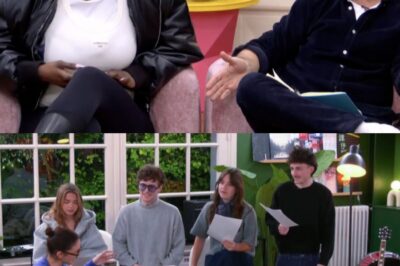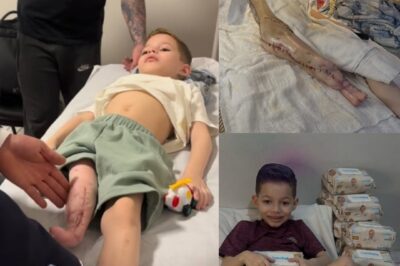Nous sommes toujours à l’hôpital. Cela fait des jours maintenant — depuis lundi — et pourtant, le temps semble ici plus lent, plus lourd, comme si les murs eux-mêmes retenaient leur souffle en attendant le prochain bip, le prochain résultat d’analyse, la prochaine fièvre.
Lily a de nouveau ces crises de fièvre neutropéniques agaçantes, mais heureusement, elles sont plus espacées. Elle en a eu une hier vers 15h30 et une autre tôt ce matin, juste avant 6h.

Même si nous savons qu’il ne s’agit « que » d’une fièvre neutropénique, ils ont tout de même effectué des hémocultures – lundi et mardi. Les deux analyses se sont révélées négatives. Malgré tout, ils maintiennent son traitement antibiotique, « au cas où ».
Je comprends pourquoi. Mais au fond, je m’inquiète.
La dernière fois qu’elle a pris des antibiotiques trop longtemps, elle a contracté une infection à Clostridium difficile , une infection douloureuse qui l’a beaucoup affaiblie et déshydratée, et qui nous a obligés à rester dans ce même hôpital pendant près de deux semaines supplémentaires. Je ne veux pas revivre ce cauchemar.
Alors j’ai dit au médecin, aussi doucement que possible,
« Si les analyses continuent de revenir négatives, peut-être pourrons-nous la retirer bientôt ? »
Il a regardé le graphique, puis m’a regardé à nouveau, et a esquissé ce genre de sourire que les médecins adressent lorsqu’ils comprennent à la fois votre peur et votre épuisement.
« Attendons encore un jour », dit-il doucement. « S’il n’y a aucun signe d’infection, nous pourrons arrêter. »
Et comme ça, je me suis sentie un peu plus légère.
Hier, Lily a reçu son
Dernière dose de vincristine du septième cycle de chimiothérapie.
Sept.
Je n’arrive toujours pas à croire que nous soyons arrivés jusque-là.
Chaque cycle a été une véritable épreuve, faite de nausées, de transfusions, de baisses de numération sanguine, d’hospitalisations et d’attente interminable. La voir traverser tout cela est parfois insupportable, et pourtant, elle le supporte avec une grâce que je ne comprendrai jamais.
Il ne nous reste plus qu’un cycle.
Sa dernière .
Si tout se passe bien, le traitement commencera début ou mi-novembre, selon la rapidité avec laquelle son taux de globules rouges se rétablit. Ce cycle-ci dure toujours un peu plus longtemps : son corps a besoin de temps pour se reconstituer après la chimiothérapie.
Ce matin, ils ont encore fait des analyses. L’infirmière m’a tendu le document imprimé, une feuille de papier remplie de chiffres noirs et d’acronymes que, avec le temps, j’ai appris à lire comme une seconde langue :
Neutrophiles : 81,2 (contre 40 hier)
GB : 0,2 (contre 0,1 hier)
Hémoglobine : 8,3 (était 8,7)
Plaquettes : 5 (contre 13 auparavant)
I looked at the numbers, my heart rising and sinking all at once. Neutrophils up—that’s good. Platelets down—that’s not. It meant she’d need another transfusion today.
To someone else, those numbers might just be statistics. To me, they’re a map of hope and worry, a language of survival.
We’re pushing to go home tomorrow.
If she can make it through the night without another fever, we just might make it. I asked the doctor this morning, trying to sound calm:
“If she’s fever-free tonight, can we go home tomorrow?”
He hesitated, then nodded.
“If things stay stable, yes.”
That word—home—has never sounded so beautiful.
We’ve been stuck here for days, doing exactly what I could be doing at home: watching for fevers, logging temperatures, giving Tylenol. Except here, everything feels sterile and suspended—no sunlight streaming through our kitchen window, no soft laughter from her little brother, no smell of pancakes in the morning.
Just the constant hum of hospital machines and the rhythmic squeak of nurses’ shoes on polished floors.
I know this place keeps her safe. But I also know healing doesn’t only happen inside hospital walls. Sometimes, it happens in the small comforts of home—the warmth of a blanket that smells like detergent you love, the soft murmur of your family moving through the house.
That’s what I want for her. Just a few days of normal.
So I’m praying—silently, constantly—that there will be no more fevers today.
Last night, something beautiful happened.
It was close to sunset, and the fluorescent lights in the hall were starting to flicker on. Lily looked up from her iPad and said,
“Mommy, can we go for a walk? I’m bored.”
I smiled. Bored. It’s such an ordinary word, but for us, it’s a gift. It means she feels well enough to move, to want something more than just lying in bed.
We took the elevator down to the second floor, where there’s a small Dunkin’ Donuts tucked near the waiting area. The smell of coffee and baked goods filled the air—mixed, as always, with that unmistakable hospital scent of antiseptic and floor polish.
Lily wore her pink knit hat, the one that hides her bald head and brings out her eyes. She held my hand tightly as we walked, IV pole trailing behind us like a quiet shadow.
We sat near the big window that overlooks the parking lot. People passed by—doctors in white coats, nurses with quick steps, families carrying bags of hope and fatigue.
And then, out of nowhere, a small miracle happened.
An older man walked past, holding a bouquet of flowers. He glanced at Lily and smiled softly.
“Aww,” he said, the way people do when they see something pure and fragile.
He took a few more steps, then suddenly turned back.
Without a word, he pulled a single flower from his bouquet, bent down, and handed it to Lily.
“This one’s for you, little warrior.”
Lily’s eyes lit up. She took the flower carefully, like it was made of glass, and smiled so wide it melted my heart.
“Thank you!” she said, her voice small but bright.
The man smiled again, nodded, and walked away.
Just like that—a stranger, a flower, a moment of grace.
Lily kept looking at the flower, turning it in her hands.
“He’s nice, Mommy. He gave me a flower.”
“Yes,” I whispered, my voice catching in my throat.
“Some people are just kind… even when they don’t have to be.”
That night, I placed the flower in a small plastic cup beside her bed. It wasn’t fancy, but it looked beautiful under the pale hospital light.
Before falling asleep, Lily glanced at it and whispered,
“Maybe it’ll bring me good luck.”
I brushed a strand of hair from her face and smiled.
“It already did, baby. It already did.”
She drifted off to sleep without another fever that night.
I stayed awake for a while, listening to her breathing—steady, calm, peaceful. Outside the window, the city lights glowed softly against the night sky. The hospital, which so often feels heavy and unyielding, seemed gentler somehow.
I thought about that stranger and his flower. He probably has no idea what that simple act meant to me—to us.
When you live in hospitals long enough, kindness becomes rare currency. It feeds something deeper than medicine ever could. It reminds you that even in all the exhaustion and fear, the world still holds beauty.
Tomorrow, we’ll know if she can finally go home.
I don’t dare hope too loudly, but I can’t help myself. I whisper a quiet prayer anyway:
“Please. Just let her rest in her own bed.”
We’ve made it through seven cycles—seven long, exhausting rounds of chemo, labs, transfusions, and sleepless nights. I’ve watched my little girl lose her hair, her appetite, her strength—and then, somehow, find it again.
She’s cried. She’s laughed. She’s fought harder than most adults ever will.
And through it all, she’s never once said, “I give up.”
Every time she looks at me and says, “I’m okay, Mommy,” I know she’s not just trying to reassure me—she’s reminding herself that she’s stronger than this disease.
I look over at that little flower by her bed, its petals slightly drooping now, and I think about how fragile life is—and how resilient.
Maybe healing doesn’t always look like a perfect lab result. Maybe sometimes it looks like a child smiling through her fear, or a stranger offering a flower, or a mother whispering prayers in the dark.
Maybe hope is built out of moments just like these.
Epilogue
The next morning, the nurse walked in with a smile that told me everything before she even spoke.
“No fever overnight!” she said. “Looks like you’re going home today.”
For a second, I couldn’t breathe. Then Lily’s eyes lit up, and she squealed,
“We’re going home, Mommy!”
I pulled her into my arms and held her tight, feeling her heartbeat against mine.
“Yes, baby,” I whispered. “We’re going home.”
The nurse smiled as she started disconnecting the IV line. Outside, sunlight was pouring through the window—the kind of light that feels like a promise.
Lily regarda la petite fleur posée sur la table de chevet et sourit.
« Tu vois, maman ? Ça portait bonheur. »
J’ai ri à travers mes larmes. « Tu avais raison. »
Tandis que nous rangions nos affaires, j’ai jeté un dernier coup d’œil autour de la pièce — aux écrans, aux machines, aux murs qui avaient été témoins à la fois de notre peur et de notre force.
Nous sommes sortis ensemble, main dans la main. La fleur est restée là, dans son pot en plastique près de la fenêtre, ses pétales captant la lumière du matin.
Un petit rappel que même dans les endroits les plus difficiles, la bonté fleurit — et l’espoir ne disparaît jamais vraiment.
News
Dame Maggie Smith : Vie Privée, Hommages du Roi et Secrets de sa Ferme Cachée du West Sussex
Hommages à une Légende Britannique : le rideau tombe sur un Trésor National Dame Maggie Smith, l’une des actrices britanniques…
Mireille Mathieu : « J’ai besoin de la présence de ma sœur. Nous vivons ensemble depuis quarante ans », son somptueux hôtel particulier tout près de Paris, avec le « plus bel arbuste de pivoines de Paris »
À Neuilly-sur-Seine, Mireille Mathieu mène une vie discrète aux côtés de sa sœur Monique, dans un hôtel particulier au charme…
Star Academy 2025 : Colère des Fans Après le Choix des Danseurs d’Aya Nakamura – Lili, Cible d’une Vague d’Accusations
L’Annonce Joyeuse qui Déclenche une Tempête Virtuelle La semaine des surprises à la Star Academy 2025 a réservé son lot…
Star Academy 2025 : Jonathan Jenvrin a Choisi les Cinq Élus qui Danseront avec Aya Nakamura sur “No Stress”
Le Défi XXL d’Aya Nakamura : une surprise en deux temps La semaine des surprises à la Star Academy 2025…
Star Academy 2025 : Lady Gaga bientôt au prime ? Un indice affole les fans !
Star Academy 2025 : Lady Gaga Bientôt au Prime ? L’Indice Qui Affole les Fans et la Mobilisation pour Ambre…
Le garçon qu’on appelle « Cyborg » — Reconstruit, pas brisé.
Avant même de le rencontrer, vous entendrez d’abord son surnom. « Cyborg. » On dirait un nom sorti d’une bande…
End of content
No more pages to load







